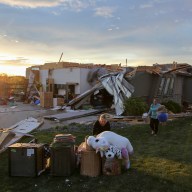By Christine Kim and David Brunnstrom
SEOUL/WASHINGTON (Reuters) – North Korean leader Kim Jong Un said he wants to boost the “warm climate of reconciliation and dialogue” with South Korea after a high-level delegation returned from the Winter Olympics, while his foes stressed the need to intensify pressure to force him to give up his nuclear weapons.
Kim gave instructions for measures aimed at more inter-Korean engagement after his younger sister Kim Yo Jong led a three-day visit to Winter Olympics in Pyeongchang, South Korea, North Korea’s state media reported on Tuesday.
It did not specify what those instructions were.
The United States has appeared to endorse deeper post-Olympics engagement between the two Koreas that could lead to talks between Pyongyang and Washington. But it has also stressed the need to ramp up sanctions to force North Korea to give up development of nuclear missiles capable of hitting America.
On Tuesday, the U.S. director of national intelligence, Dan Coats, said North Korea presented “a potentially existential” threat and said time was running out to act.
“Decision time is becoming ever closer in terms of how we respond to this,” Coats told a Senate Intelligence Committee hearing. “Our goal is a peaceful settlement. We are using maximum pressure on North Korea in various ways.”
CIA Director Mike Pompeo told the hearing there was “no indication there’s any strategic change” in Kim’s desire to retain a nuclear threat to the United States.
Coats said in an annual threat assessment report North Korea was likely to continue weapons testing in 2018 and noted that it had said it was considering an atmospheric nuclear test. The report said Pyongyang’s repeated statements that nuclear weapons were the basis for its survival “suggest the regime does not intend to negotiate them away.”
Last year, North Korea conducted dozens of missile launches and its sixth and largest nuclear test in defiance of United Nations sanctions. However, it has now been more than two months since its last missile test in late November.
South Korea says its president, Moon Jae-in, who has been pushing for a diplomatic solution to the standoff with North Korea, was offered a meeting with Kim Jong Un in Pyongyang via his sister.
U.S. Vice President Mike Pence told the Washington Post after attending the Olympics that Washington would step up its “maximum pressure campaign” against North Korea, but was open to talks without preconditions.
U.S. SAYS NO POLICY CHANGE
State Department spokeswoman Heather Nauert said this did not represent a policy change from the U.S. insistence that any talks with North Korea must be aimed at its denuclerization.
“To be able to set the agenda for what you want to talk about – and that would be denuclerization – you may have to have a preliminary chat about what that discussion would look like,” she told a regular news briefing.
Moon said on earlier on Tuesday that the United States saw the intra-Korean dialogue in a positive light and was open to talks with North Korea, his spokesman said.
Japan’s Prime Minister Shinzo Abe said Moon had agreed at the Olympics on the need to keep up maximum pressure on North Korea.
Japanese officials were at pains to stress there was no daylight between Japan, the United States and South Korea on North Korea.
“The goal is denuclearization and the process is dialogue for dialogue, action for action, so if North Korea does not show actions, the United States and Japan will not change their policies,” a senior Japanese diplomat told lawmakers.
Pompeo said last month North Korea could be only “a handful of months” away from being able make a nuclear attack on the United States.
While stressing its preference for a diplomatic solution, Washington has warned that all options are on the table, including military ones, to prevent this, although talk of preventive strikes has eased since the Koreas resumed dialogue last month.
A senior South Korean military official stationed at the border between North and South Korea told Reuters North Korea had lowered the volume of its border propaganda broadcasts since the Olympics’ opening ceremony on Feb. 9.
“I still hear it, but it is much less than before,” the official said on condition of anonymity.
DIPLOMATIC SOLUTION
Seoul is planning to push ahead with its plans for reunions of family members separated by the 1950-53 Korean War in order to sustain the dialogue prompted by the North Korean delegation’s visit.
Talk of an inter-Korean summit, which would be the first since 2007, comes after months of tension between Pyongyang, Seoul and Washington.
As with North Korean media over the weekend, KCNA again made no mention of the summit offer made to Moon.
It said Kim Jong Un expressed gratitude to Seoul for its “sincere efforts” to prioritize the North Korean delegation’s visit and called them “very impressive”.
Moon and his administration hosted several meetings and meals for the delegation during their stay at the presidential Blue House and luxury five-star hotels, while Moon personally accompanied Kim Yo Jong to Olympic events and a concert.
(Reporting by Christine Kim; Additional reporting by Linda Sieg and Tim Kelly in TOKYO, James Pearson in PYEONGCHANG and David Brunnstrom, Doina Chiacu and Patricia Zengerle in WASHINGTON; Editing by Lincoln Feast and Jonathan Oatis)


















